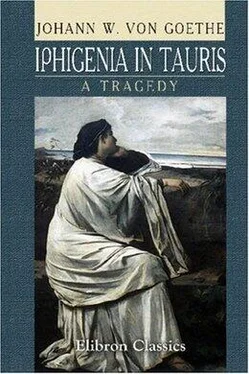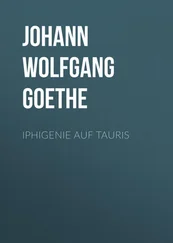PYLADES.
Farewell! I haste to re–assure our friends,
Who anxiously await us: then with speed
I will return, and, hid within the brake,
Attend thy signal.—Wherefore, all at once,
Doth anxious thought o'ercloud thy brow serene?
IPHIGENIA.
Forgive me! As light clouds athwart the sun,
So cares and fears float darkling o'er my soul.
PYLADES.
Oh, banish fear! With danger it hath form'd
A close alliance,—they are constant friends.
IPHIGENIA.
It is an honest scruple, which forbids
That I should cunningly deceive the king,
And plunder him who was my second sire.
PYLADES.
Him thou dost fly, who would have slain thy brother.
IPHIGENIA.
To me, at least, he hath been ever kind.
PYLADES.
What Fate commands is not ingratitude.
IPHIGENIA.
Alas! it still remains ingratitude;
Necessity alone can justify it.
PYLADES.
Thee, before gods and men it justifies.
IPHIGENIA.
But my own heart is still unsatisfied.
PYLADES.
Scruples too rigid are a cloak for pride.
IPHIGENIA.
I cannot argue, I can only feel.
PYLADES.
Conscious of right, thou shouldst respect thyself.
IPHIGENIA.
Then only doth the heart know perfect ease,
When not a stain pollutes it.
PYLADES.
In this fane
Pure hast thou kept thy heart. Life teaches us
To be less strict with others and ourselves;
Thou'lt learn the lesson too. So wonderful
Is human nature, and its varied ties
Are so involv'd and complicate, that none
May hope to keep his inmost spirit pure,
And walk without perplexity through life.
Nor are we call'd upon to judge ourselves;
With circumspection to pursue his path,
Is the immediate duty of a man.
For seldom can he rightly estimate,
Or his past conduct or his present deeds.
IPHIGENIA.
Almost thou dost persuade me to consent.
PYLADES.
Needs there persuasion when no choice is granted?
To save thyself, thy brother, and a friend,
One path presents itself, and canst thou ask
If we shall follow it?
IPHIGENIA.
Still let me pause,
For such injustice thou couldst not thyself
Calmly return for benefits receiv'd.
PYLADES.
If we should perish, bitter self–reproach,
Forerunner of despair, will be thy portion.
It seems thou art not used to suffer much,
When, to escape so great calamity,
Thou canst refuse to utter one false word.
IPHIGENIA.
Oh, that I bore within a manly heart!
Which, when it hath conceiv'd a bold resolve,
'Gainst every other voice doth close itself.
PYLADES.
In vain thou dost refuse; with iron hand
Necessity commands; her stern decree
Is law supreme, to which the gods themselves
Must yield submission. In dread silence rules
The uncounsell'd sister of eternal fate.
What she appoints thee to endure,—endure;
What to perform,—perform. The rest thou know'st.
Ere long I will return, and then receive
The seal of safety from thy sacred hand.
alone
.
I must obey him, for I see my friends
Beset with peril. Yet my own sad fate
Doth with increasing anguish move my heart.
May I no longer feed the silent hope
Which in my solitude I fondly cherish'd?
Shall the dire curse eternally endure?
And shall our fated race ne'er rise again
With blessings crown'd?—All mortal things decay!
The noblest powers, the purest joys of life
At length subside: then wherefore not the curse?
And have I vainly hop'd that, guarded here,
Secluded from the fortunes of my race,
I, with pure heart and hands, some future day
Might cleanse the deep defilement of our house?
Scarce was my brother in my circling arms
From raging madness suddenly restor'd,
Scarce had the ship, long pray'd for, near'd the strand,
Once more to waft me to my native shores,
When unrelenting fate, with iron hand,
A double crime enjoins; commanding me
To steal the image, sacred and rever'd,
Confided to my care, and him deceive
To whom I owe my life and destiny.
Let not abhorrence spring within my heart!
Nor the old Titan's hate, toward you, ye gods,
Infix its vulture talons in my breast!
Save me, and save your image in my soul!
An ancient song comes back upon mine ear—
I had forgotten it, and willingly—
The Parcæ's song, which horribly they sang,
What time, hurl'd headlong from his golden seat,
Fell Tantalus. They with their noble friend
Keen anguish suffer'd; savage was their breast
And horrible their song. In days gone by,
When we were children, oft our ancient nurse
Would sing it to us, and I mark'd it well.
Oh, fear the immortals,
Ye children of men!
Eternal dominion
They hold in their hands.
And o'er their wide empire
Wield absolute sway.
Whom they have exalted
Let him fear them most!
Around golden tables,
On cliffs and clouds resting
The seats are prepar'd.
If contest ariseth;
The guests are hurl'd headlong,
Disgrac'd and dishonour'd,
And fetter'd in darkness,
Await with vain longing,
A juster decree.
But in feasts everlasting,
Around the gold tables
Still dwell the immortals.
From mountain to mountain
They stride; while ascending
From fathomless chasms,
The breath of the Titans,
Half stifl'd with anguish,
Like volumes of incense
Fumes up to the skies.
From races ill–fated,
Their aspect joy–bringing,
Oft turn the celestials,
And shun in the children
To gaze on the features
Once lov'd and still speaking
Of their mighty sire.
Thus sternly the Fates sang
Immur'd in his dungeon.
The banish'd one listens,
The song of the Parcæ,
His children's doom ponders,
And boweth his head.
ARKAS.
I own I am perplex'd, and scarcely know
'Gainst whom to point the shaft of my suspicion,
Whether the priestess aids the captives' flight,
Or they themselves clandestinely contrive it.
'Tis rumour'd that the ship which brought them here
Is lurking somewhere in a bay conceal'd.
This stranger's madness, these new lustral rites,
The specious pretext for delay, excite
Mistrust, and call aloud for vigilance.
THOAS.
Summon the priestess to attend me here!
Then go with speed, and strictly search the shore,
From yon projecting land to Dian's grove:
Forbear to violate its sacred depths;
A watchful ambush set, attack and seize,
According to your wont, whome'er ye find.
[
Arkas retires.
alone
.
Fierce anger rages in my riven breast,
First against her, whom I esteem'd so pure;
Then 'gainst myself, whose foolish lenity
Hath fashion'd her for treason. Man is soon
Inur'd to slavery, and quickly learns
Submission, when of freedom quite depriv'd.
If she had fallen in the savage hands
Of my rude sires, and had their holy rage
Forborne to slay her, grateful for her life,
She would have recogniz'd her destiny.
Have shed before the shrine the stranger's blood,
And duty nam'd what was necessity.
Now my forbearance in her breast allures
Audacious wishes. Vainly I had hop'd
To bind her to me; rather she contrives
To shape an independent destiny.
She won my heart through flattery; and now
That I oppose her, seeks to gain her ends
By fraud and cunning, and my kindness deems
A worthless and prescriptive property.
Читать дальше












